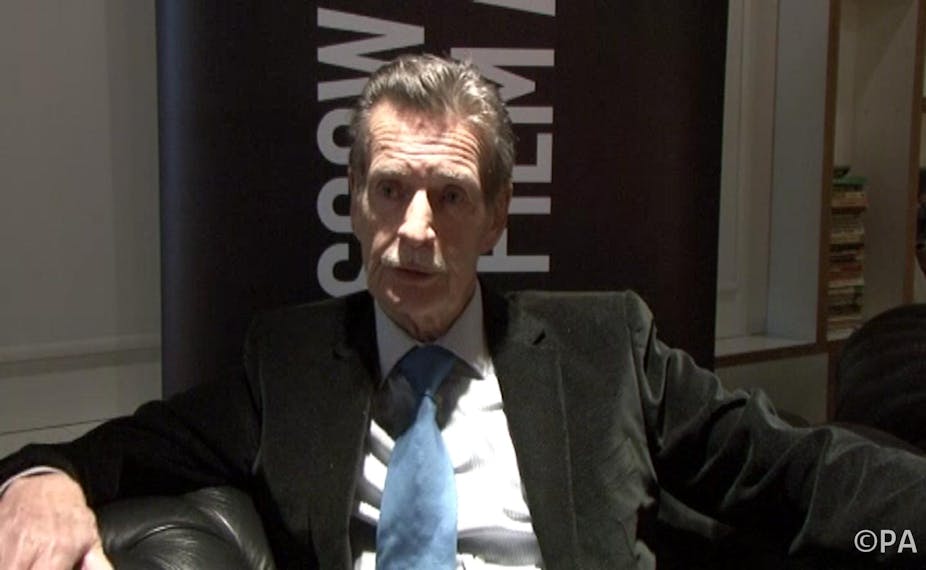Much has been trotted out since the death of Scotland’s greatest living novelist, William McIlvanney, about how he was “the godfather of tartan noir” and the “keeper of Scotland’s soul”. The first label used to rub him up the wrong way. And though he once told me that he was flattered by the second description, what he wanted was to live in a country with a conscience that was more generally in evidence.
I first became acquainted with Willie as a young lecturer at the University of Strathclyde in the mid-1990s when he was Visiting Professor in English. Through numerous discussions about class and literature, we developed a very cordial relationship. Coming from a working-class background, I would occasionally worry I was selling out doing all this high-culture stuff. Willie, a miner’s son from Kilmarnock, always assured me that this was a fear I should not entertain. He never believed that high art was an exclusive province.
He was a socialist, though mainly in the practical sense. He believed that communal values make us most human, enabling us to shelter one another from inevitable misfortunes – self-inflicted or otherwise. His writing often speaks to intelligent working-class protagonists who are either self-taught or have made their way on the back of their education.
A good example is his first novel, Remedy is None [1966], which won the Geoffrey Faber Memorial Prize. It is a brilliantly paced, nerve-jangling story about Charlie, a young university student from an industrial town in the west of Scotland. Charlie aspires to be a writer while coping with a dying father and early adult relationships. Camus and Hamlet are often cited as influences, both here and indeed across the McIlvanney canon.
Class act
Willie’s coming to prominence in the 1960s spoke to the new appetite of the post-war period for the working-class point of view. He spoke about this world in a way that was more eloquent, unblinkered and trenchant than anyone else. His talent was such that he would always have emerged, though. He was one of the finest prose-stylists in English fiction since Robert Louis Stevenson or Thomas Hardy.
Willie’s third and greatest novel, Docherty (1975), is arguably one of the finest of all historical novels ever to be produced in Britain. Its eponymous protagonist is a miner coping with the Great Depression of the 1930s. Both Docherty and the overall narrative feature a sharpness of wit that often unsentimentally cuts through the grimmest of circumstance.

A second historical novel, The Kiln (1996), narrates the trajectory of British life from the 1950s down to the period of Thatcher. It is sceptical of the still prevalent myth that things are constantly getting better. This is McIlvanney at his most graceful – understanding of individual endeavour and scathing of heartless and unintelligent ideology, especially Thatcherism.
And Willie also spoke for the United Kingdom as much as his native Caledonia. He felt class was ultimately more important than nation, and certainly swithered over the Scottish independence referendum. He voted Yes in the end, but for what he told me were “strategic reasons”.
There’s been a murder …
It is well known Willie was gazumped by the popular TV series Taggart. He had been in talks around the same time about televising his fictional detective, Laidlaw, who features in Laidlaw (1977), The Papers of Tony Veitch (1983) and Strange Loyalties (1991). Laidlaw is naturally a philosopher, led by squalid crimes to extended meditations on modern culture. He is often pessimistic about human actions, yet mines out occasions of nobility all the more impressive because the odds are stacked against them. Dozens of crime writers have followed this template over the past quarter century or so. Though Willie felt that the “godfather” epithet implied intentions he never had, there is no denying his influence.
It is often assumed writers know how to talk about literature when they usually don’t. But Willie most certainly did, and I remember watching fascinated as he entranced a class with his reading of Walter Scott’s The Two Drovers as the “first western”. It undoubtedly helped that he could draw on his own 17 years of schoolteaching. I’ve had at least a dozen chance meetings with his former pupils over discussions about modern Scottish writing. Their tale is always similar – he was a life-enhancing teacher.
He was also superb company. In 2006 I spent several days with Willie, another academic and two journalists giving lectures and readings in St Petersburg. We encountered the Russian mafia and the even scarier local police. We were locked out of our hotel and then inside a minibus after our driver had been arrested for a traffic infringement. We were left there unsure if we would ever be let out. Willie’s easy sense of humour made the whole situation more bearable.
Verse intentions
When the McIlvanney oeuvre is inevitably reassessed, I hope his poetry receives more attention. Willie loved poetry, and was at least as knowledgeable in the genre as in fiction. Chairing an event with him in attendance, I once committed the faux-pas of referring to his two volumes of poetry. “Three,” he immediately shouted.

Willie’s poetry managed to combine stylistic rigour and linguistic playfulness with clear communication. The best is perhaps The Longships in Harbour: Poems [1970]. He displays the same lyricism, forensic intelligence and sympathy as in his fiction.
He always had a gift for reflecting on life’s difficulties with clear-sighted tenderness and wit: art does not necessarily redeem but it is part of our common humanity. He rightly valued being widely accessible, and won new admirers at public events with the same charisma and courtesy that were apparent in his writing. As we prepare to say goodbye to William McIlvanney at his funeral on December 16, he should be remembered as one of the finest British novelists of the last 60 years.

